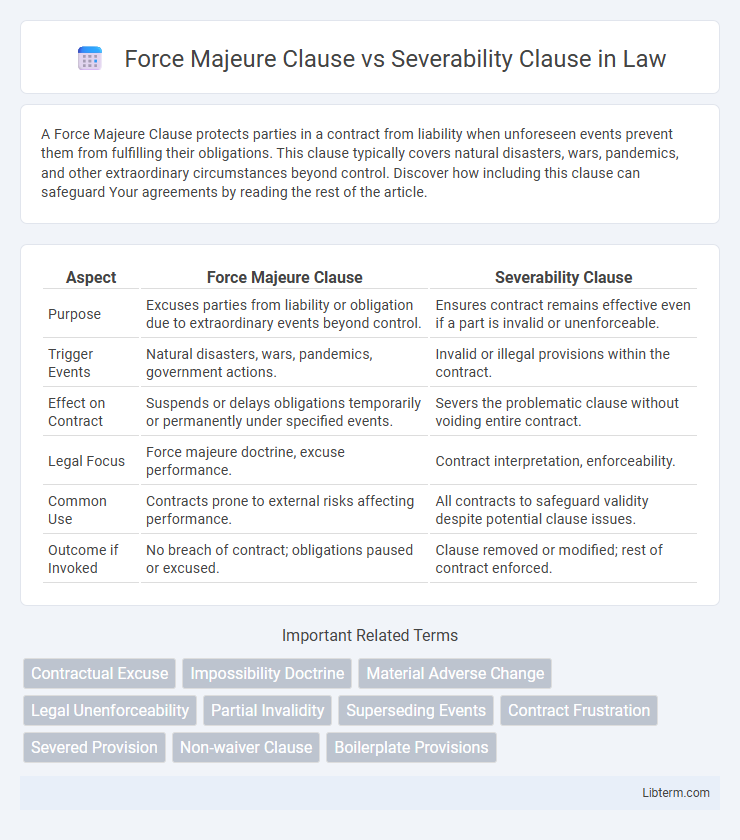A Force Majeure Clause protects parties in a contract from liability when unforeseen events prevent them from fulfilling their obligations. This clause typically covers natural disasters, wars, pandemics, and other extraordinary circumstances beyond control. Discover how including this clause can safeguard Your agreements by reading the rest of the article.
Table of Comparison
| Aspect | Force Majeure Clause | Severability Clause |
|---|---|---|
| Purpose | Excuses parties from liability or obligation due to extraordinary events beyond control. | Ensures contract remains effective even if a part is invalid or unenforceable. |
| Trigger Events | Natural disasters, wars, pandemics, government actions. | Invalid or illegal provisions within the contract. |
| Effect on Contract | Suspends or delays obligations temporarily or permanently under specified events. | Severs the problematic clause without voiding entire contract. |
| Legal Focus | Force majeure doctrine, excuse performance. | Contract interpretation, enforceability. |
| Common Use | Contracts prone to external risks affecting performance. | All contracts to safeguard validity despite potential clause issues. |
| Outcome if Invoked | No breach of contract; obligations paused or excused. | Clause removed or modified; rest of contract enforced. |
Understanding Force Majeure Clauses
Force majeure clauses define specific extraordinary events, such as natural disasters, pandemics, or government actions, that excuse parties from fulfilling contractual obligations without penalty. These clauses must clearly list triggering events to avoid ambiguity and ensure enforceability in courts. Understanding the scope and limitations of force majeure provisions is crucial for managing contractual risks during unforeseen disruptions.
Key Elements of Severability Clauses
Severability clauses ensure that if one provision of a contract is found invalid or unenforceable, the remaining provisions remain effective and binding, preserving the contract's overall intent. Key elements include clear language specifying that unenforceable parts do not affect other provisions and a mechanism for replacing illegal or void terms with lawful alternatives. This clause protects contractual stability by preventing the entire agreement from becoming void due to a single flawed section, distinguishing it from force majeure clauses that address unforeseeable events impacting performance.
Legal Purpose of Force Majeure Clauses
Force Majeure clauses legally protect parties from liability when unforeseen events like natural disasters, war, or pandemics prevent contract fulfillment, effectively suspending obligations without breach. These clauses define the scope of excusable non-performance by specifying events beyond reasonable control, ensuring risk allocation and contractual fairness. In contrast, Severability clauses ensure the validity of remaining contract provisions if one section is invalid or unenforceable, without addressing performance disruptions.
The Role of Severability Clauses in Contracts
Severability clauses ensure that if one provision of a contract is found invalid or unenforceable, the remainder of the agreement remains effective and binding, preserving the parties' intent. Unlike force majeure clauses that excuse performance due to unforeseeable events, severability clauses protect the contract's overall integrity by isolating problematic terms. This mechanism minimizes the risk of entire contracts being voided, providing stability and predictability in legal agreements.
Core Differences Between Force Majeure and Severability
The Force Majeure clause addresses unforeseen events that prevent contractual obligations from being performed, excusing parties from liability during such disruptions. The Severability clause ensures that if any part of a contract is found invalid or unenforceable, the remaining provisions continue to operate unaffected. Unlike Force Majeure, which deals with external, uncontrollable events disrupting performance, Severability focuses on maintaining contract integrity despite legal invalidity of specific terms.
When to Include Force Majeure Clauses
Force majeure clauses should be included in contracts where unforeseen events like natural disasters, wars, or pandemics could prevent parties from fulfilling their obligations, protecting them from liability during such disruptions. These clauses are essential in industries vulnerable to external risks, such as construction, supply chain logistics, and event management. In contrast, severability clauses address the enforceability of contract provisions, ensuring unaffected sections remain valid if one part is invalidated, and do not substitute for protection against force majeure events.
Scenarios Triggering Severability Clauses
Severability clauses are triggered when a specific provision in a contract is found to be invalid, illegal, or unenforceable, allowing the remainder of the agreement to remain effective and enforceable. Scenarios include instances where a court rules part of a contract void due to conflicting regulations, unlawful terms, or ambiguous language that could undermine overall intent. Unlike force majeure clauses, which address unforeseen external events like natural disasters disrupting performance, severability protects contract integrity by isolating problematic sections without nullifying the entire agreement.
Impact on Contract Obligations
The Force Majeure clause temporarily suspends or exempts parties from fulfilling contractual obligations due to unforeseen events beyond their control, such as natural disasters or war, directly affecting performance timelines and duties. The Severability clause ensures that if one part of the contract is found invalid or unenforceable, the remainder of the agreement stays intact, preserving overall contractual obligations without voiding the entire contract. Together, these clauses protect contractual integrity while addressing uncontrollable circumstances and enforceability issues.
Drafting Tips for Both Clauses
When drafting a Force Majeure Clause, clearly define the scope of events that qualify as force majeure, such as natural disasters, wars, or pandemics, and specify the procedures for notification and remedial actions. For a Severability Clause, ensure the language preserves the contract's validity by stating that if any provision is deemed unenforceable, the remainder of the agreement remains effective and enforceable. Precise, unambiguous terms and alignment with applicable jurisdictional laws enhance the enforceability and clarity of both clauses.
Force Majeure vs Severability: Practical Examples
Force Majeure clauses excuse parties from contractual obligations when extraordinary events like natural disasters or pandemics occur, temporarily suspending performance without breach. Severability clauses ensure that if part of a contract is invalid or unenforceable, the remaining provisions remain effective, preserving the overall agreement. For example, a Force Majeure event like a hurricane delays delivery without penalty, while a Severability clause allows the contract to continue even if a particular term, such as a non-compete clause, is struck down by a court.
Force Majeure Clause Infographic

 libterm.com
libterm.com